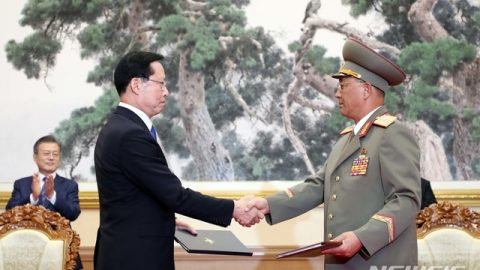2014-02-09
If you want to take someone’s possession and make it yours, the first thing you should do is rename it. Extended to a national level, that’s what Japan did with Dokdo (Takeshima) and the East Sea (Sea of Japan). Imperial Japan even tried to change the names of Korean people to Japanese, and turn them into Emperor Hirohito’s subjects.
The East Sea is the last such vestige of the colonial era, for which Korea has yet to fully regain its name, especially on the international stage.
It is against this backdrop that we find it very significant Virginia’s legislature decided Thursday to back Korea’s position in its sea-naming dispute with Japan and mandate that textbooks used there, and possibly five or six other U.S. states, use the name East Sea alongside the Japanese name.
The Korean-American community in Virginia deserves high praise for realizing what no others ― including the government of their fatherland ― have done, brushing aside the Japanese embassy’s counter-lobbying.
“This is not the end but a crucial beginning,” Peter Kim, leader of the community, was quoted as saying, rightly. Ethnic Koreans in other states, such as New York and New Jersey, also have reportedly launched similar campaigns with the ultimate aim of moving the U.S. federal government to use both names for the body of water between America’s two East Asian allies.
The U.S. government is adopting the single-name principle, using only one name even for places in international dispute. We think it neither fair nor reasonable, considering some places have gotten their names through one-sided processes during an era when national power was synonymous with international justice.
Critics also question the wisdom of politicians intervening in academic or historical matters. True, politicians would have little place in the areas of pure academia or natural science. But could there be any groups better suited than politicians to rectify the historical wrongs decided by international politics in imperial days? Kim, the Korean-American leader in Virginia, was right when he said the “East Sea legislation” was a victory for both ethnic Koreans and the U.S. democracy.
It was no coincidence in this regard that the Korean government began to take issue with the sea-naming in 1992, when the nation restored civilian rule, putting an end to military dictatorship, a remnant of colonization.
Japan under Prime Minister Shinzo Abe, on the other hand, is going markedly backward, whitewashing his country’s wartime misdeeds and glorifying its war dead, including even Class A war criminals. Koreans are at a loss for words seeing Tokyo move to register Japan’s notorious suicidal air force squadrons of “kamikaze” on the UNESCO heritage list as well as industrial facilities where hundreds of thousands of Korean forced laborers toiled away and died.
Who can rule out the possibility Japan would someday go as far as to justify its attack on Pearl Harbor as inevitable strikes to ward off U.S. invasion into Asia?
If this diplomatic proxy war spreads to other U.S. states, prospects may not be very bright for Korean-Americans, who still are inferior to Japanese-Americans in number and other terms. And this stresses the need for Seoul to become a more active, and effective, supporter than it is now.
As far as East Sea is concerned, Seoul cannot say it has done more than a group of young cyber warriors, called the Voluntary Agency Network of Korea, VANK. We know the Korean embassy in Washington played a role in Virginia. Again, however, the battle has only begun.
source : Korea Times
http://koreatimes.co.kr/www/news/opinon/2014/02/137_151275.html


